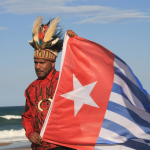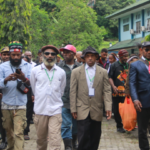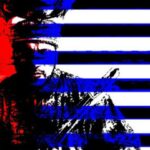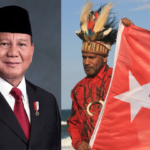Wenda Confirms West Papua is Readying to Gain Independence from an Indonesia in Chaos
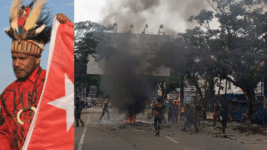
“Indonesia is in chaos, as massive protests have erupted over corruption, economic hardship, and police brutality,” declared West Papuan provisional government president Benny Wenda in a 1 September 2025 statement. “I call on all my people to get ready for another escalation back home. West Papua is ready to depart from this dying empire.”
“This time, the protesters’ conflict is not only with the TNI (the Indonesian National Armed Forces), but with the DPR, the parliament, that is supposed to represent them,” the West Papuan leader continued. “The Indonesian government is showing that they do not have the trust of their own people. How can they claim legitimacy over a different nation, illegally occupied for sixty years?”
Beginning on 25 August 2025, Indonesian civil society protests against the government of president Prabowo Subianto have rocked the country in a manner that evokes the 1998 protests that ended the three decade reign of former dictator Suharto. The spark for the current protests was an exorbitant housing allowance for MPs, and they escalated after a delivery driver was killed by police.
The “different nation” Wenda accuses Jakarta of occupying is West Papua, which is a Melanesian country that was colonised by the Netherlands, alongside Indonesia. Yet, when it came to decolonising, the Europeans evacuated Indonesia in 1949 but didn’t pull out of West Papua until 1962, and then Jakarta force a temporary administrative arrangement to become permanent.
As the recent civil society protests were of such magnitude that they suggested the potential for a power shift in the Southeast Asian nation, and the Prabowo government even made a rare concession, backing down on its proposal to beef-up lawmaker’s coffers even further, West Papua has already established an entire government infrastructure on the ground in the occupied territory.
Rebirth of the West Papuan state
“While the United Liberation Movement for West Papua (ULMWP) supports the anti-government action, this is not our struggle,” Wenda said, on the position of the organization he leads. “West Papuans oppose Prabowo, as we have opposed every leader of the Indonesian occupation.”
“We are fighting for the liberation of West Papua, not for the improvement of Indonesia’s democracy,” the West Papuan provisional government president continued.
“For over half a century we have suffered rape, torture, arbitrary arrest, exploitation, political imprisonment, genocide, ecocide and the destruction of our ancestral land. We are ready to leave.”
Wenda announced the formation of the provisional government he leads in January 2021, and by May that year, the body had established a political infrastructure on the ground, with 12 government departments, while the West Papuan Legislative Council had its inaugural meeting in Jayapura on 5 July this year, which was hailed as the “rebirth of the West Papuan state”.
Ten people have died in the recent protests across Indonesia, which are in response to the government having announced a new housing allowance for MPs, which was 10 times the annual average minimum wage in Jakarta, and then the Brimob police unit, a notorious paramilitary national police squad, ran down and killed 21-year-old delivery driver Affan Kurniawan on 28 August.
Following the death of Kurniawan, the demonstrations escalated with government buildings and minsters houses being ransacked. The protests took place nationwide. Along with the capital of Jakarta on the island of Java, demonstrations broke out in the provinces of Aceh, West Kalimantan, South Sulawesi and Sumatra.
“These murderers have terrorised West Papua for years,” Wenda added, in respect of the killing of the delivery driver. “As well as killing ten civilians during the 2023 Wamena massacre, they are also responsible for the recent executions of Tobias Silak, Charles Kogoya, Yosia Keiya and 13-year-old Ronaldus Duwitau.”
Creeping authoritarianism
In many ways, Prabowo represents the repressions of the Suharto days. A former defence minister under his predecessor Joko Widodo, Prabowo had a three-decade-long military career under the Suharto regime. Primarily as a member of Kopassus, the Indonesian special forces, then general Prabowo carried out violent reigns of terror initially in East Timor, prior to moving on to West Papua.
So gratuitous was Prabowo’s time in the Indonesian special forces that it earnt him a two-decade-long ban from the United States, due to his human rights abuses. This prohibition was revoked in 2020.
Yet, the current Indonesian president has not been in office for 12 months as yet, and his administration is already experiencing the most dramatic civil society upheaval since the 1998 demonstration that marked the end of authoritarian rule of his former father-in-law Suharto and heralded in a period of democracy. But the creeping back towards the despotic began under Joko.
Former general Prabowo also recently announced a massive expansion of the military, in what many consider a reversal back towards the militarisation of the Suharto years. Prabowo has established 100 new military units, which will start to be employed in nonmilitary sectors, such as agriculture. He further envisages 500 new units. Although last time this strategy was used in Indonesia it failed.
“Through transmigration, increased militarisation and the industrial developments in Merauke, Raja Ampat and Intan Jaya, the war criminal Prabowo is speeding up the destruction of West Papua,” Wenda further made clear. “Now his own people have turned on him. He has only been in power for a year, and yet Indonesia is collapsing.”
Under Prabowo, the largest deforestation project on the planet is escalating in the West Papuan regency of Merauke. This will entail a total of 300 million hectares being cleared for sugarcane and rice. Established under Widodo, this monoculture project will leave the land barren and infertile after it’s finished, and it will further displace up to 50,000 West Papuans over its lifespan.
West Papuan self-determination
Wenda has called on the member states of the Pacific Islands Forum and the Melanesian Spearhead Group to provide assurances to the people of West Papua in these “dangerous times”, and he emphasises that the situation of colonial rule for West Papuans, which is already unsafe, is only set to worsen as the tensions within the nation of Indonesia spill over.
The Netherlands handed control of West Papua to the United Nations in 1962, under the terms of the New York Agreement, which then saw Jakarta handed the administration of the region on the proviso that it would hold a referendum allowing the West Papuans to decide whether to stick with Indonesia rule or to go their own way.
However, the 1969 UN-brokered “Act of Free Choice” was a sham, which saw the Indonesian military select 1,026 West Papuans to take part in the vote, and via threat of gunpoint, they all voted to remain with Jakarta.
But 1.8 million West Papuans, or 70 percent of the population, have recently signed the West Papuan People’s Petition, which was presented to the UN General Assembly and calls for a renewed referendum on self-determination.
“To my people, I ask you to be vigilant,” Wenda continued in his statement last week. “West Papuans living in Jakarta or other parts of Indonesia should make preparations to return home.”
The president further reminded his people that back in 1998, with the fall of Suharto, which lead to freedom in Timor-Leste, almost saw West Papuan independence via the establishment of the Papua Presidium Council (PDP), prior to Jakarta launching a crackdown on the movement’s leaders.
“The ULMWP is ready to play the role of the PDP and take charge of our country when the coloniser leaves,” West Papuan president Benny Wenda said in concluding. “West Papuans are ready to run our own affairs.”


